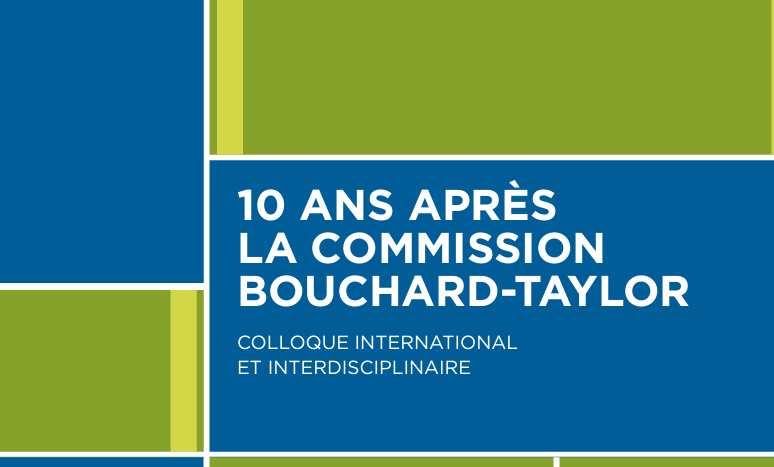10 ans après la commission Bouchard-Taylor
10th anniversary of the Bouchard-Taylor Commission, Montreal
Link to the event19 October 2017
 In the spring of 2007, after several months of public controversy about reasonable accommodation, integration policies and ethno-religious minorities, the Bouchard-Taylor commission was established. A few months later, in May of 2008, its report was disclosed. It was remarkably well received around the world, being discussed in several countries that were facing similar challenges. A decade later, this book and symposium project offers an opportunity to reflect on the challenges that have continued to increase in managing cultural and religious diversity. Other public debates on diversity have been held in several countries, particularly in the form of commissions. What are their outcomes, impacts and implications, strengths and weaknesses? How do relationships play out among experts, public policy and civil society? How was the Bouchard-Taylor report received here and elsewhere? What are the management models proposed and what forces are resisting them? Between neutrality, laïcité and State secularity which are increasingly emphasized, and maintaining the multiple influences of historic religious majorities in many contexts, what inroads are being made by individual and collective rights? Have discussions about multiculturalism and interculturalism created new pathways? Have the barriers between cultures and religions been moved or reconfigured? How is atheism changing the face of convictional pluralism? What is the significance of the success of various strategies of identitarian and populist policies in several countries? How can we understand the responses and their variations, which have varying degrees of effectiveness, to the widespread problems faced by refugees?
In the spring of 2007, after several months of public controversy about reasonable accommodation, integration policies and ethno-religious minorities, the Bouchard-Taylor commission was established. A few months later, in May of 2008, its report was disclosed. It was remarkably well received around the world, being discussed in several countries that were facing similar challenges. A decade later, this book and symposium project offers an opportunity to reflect on the challenges that have continued to increase in managing cultural and religious diversity. Other public debates on diversity have been held in several countries, particularly in the form of commissions. What are their outcomes, impacts and implications, strengths and weaknesses? How do relationships play out among experts, public policy and civil society? How was the Bouchard-Taylor report received here and elsewhere? What are the management models proposed and what forces are resisting them? Between neutrality, laïcité and State secularity which are increasingly emphasized, and maintaining the multiple influences of historic religious majorities in many contexts, what inroads are being made by individual and collective rights? Have discussions about multiculturalism and interculturalism created new pathways? Have the barriers between cultures and religions been moved or reconfigured? How is atheism changing the face of convictional pluralism? What is the significance of the success of various strategies of identitarian and populist policies in several countries? How can we understand the responses and their variations, which have varying degrees of effectiveness, to the widespread problems faced by refugees?
This content has been updated on 11 July 2022 at 11 h 37 min.
